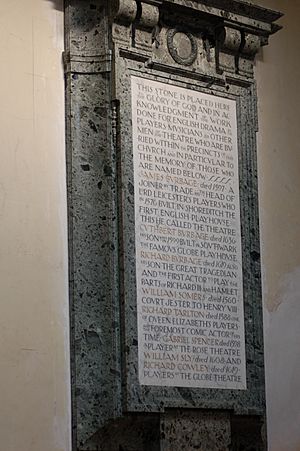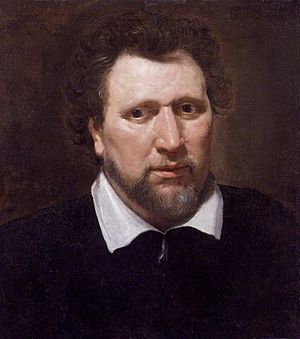Gabriel Spenser facts for kids
Quick facts for kids
Gabriel Spenser
|
|
|---|---|

A memorial plaque in St Leonard's, Shoreditch commemorating Spenser and other actors.
|
|
| Born | c. 1578 |
| Died | 1598 (aged 19–20) Hoxton, London
|
| Occupation | Actor |
| Years active | 1596-1598 |
Gabriel Spenser, also spelled Spencer, (born around 1578 – died September 22, 1598) was an actor during the time of Queen Elizabeth I in England. He is mostly remembered for some fights he was involved in. Sadly, his life ended in a duel with the famous writer Ben Jonson.
Contents
Becoming an Actor
Gabriel Spenser's name shows up in old documents as an actor. He worked with two of the biggest theater groups of his time.
Early Acting Roles
Spenser first worked with Francis Langley in a group called the Earl of Pembroke's Men. He might have also worked for the Lord Chamberlain's Men. In one version of Shakespeare's play Henry VI, Part 3, a stage direction says "enter Gabriel." Many people think this means Gabriel Spenser played a messenger in that play. Sometimes, actors' names were accidentally used instead of character names in published plays.
It's also thought that Spenser might have been the actor behind a less accurate version of Romeo and Juliet that was published in 1597. This might have happened if the play was put together from memory by actors.
Trouble with The Isle of Dogs
In July 1597, Spenser got into trouble. He was put in prison after acting in a play called The Isle of Dogs. This play was written by Ben Jonson and Thomas Nashe. It was thought to be rebellious against the government.
It's not clear why only Spenser and another actor, Robert Shaw, were jailed along with Jonson. Nashe, the other writer, ran away from London. Reports said that other actors would be arrested, but no one else ever was. Spenser was held for eight weeks before he was set free.
Joining the Admiral's Men
In November 1597, Spenser left the Earl of Pembroke's Men. He joined Philip Henslowe's company, the Admiral's Men. Spenser became a "shareholder" in this new group. This meant he got a part of the money the company earned each day from ticket sales.
Because he left his old company, Francis Langley sued Spenser. Langley said Spenser had broken his contract. In March 1598, Spenser was also a witness for a contract between Henslowe and another famous writer, Thomas Heywood.
An Unfortunate Incident
In December 1596, while Spenser was still with Langley's company, he had a serious argument. It happened with a man named James Feake, who was the son of a goldsmith. The argument took place at a barber's house in Shoreditch.
The fight became very heated. Feake tried to throw a heavy candle holder at Spenser. In response, Spenser used his sword. The sword was still in its cover, but it sadly hit Feake in the eye and went into his brain. Feake was badly hurt and died three days later.
There are no records that show Spenser was punished for this. He might have successfully argued that he acted in self-defense.
Spenser's Death
On September 22, 1598, Gabriel Spenser fought a duel with Ben Jonson. A duel is a planned fight between two people, usually with swords or pistols, to settle a disagreement. This duel happened in a place called Hoxton fields. We don't know why they decided to fight.
The Duel's Outcome
Years later, Ben Jonson told his side of the story. He said Spenser started the duel and had a longer sword, which gave him an advantage. Spenser wounded Jonson in the arm. But Jonson fought back and managed to strike Spenser, killing him. An official report said Spenser died from a six-inch deep stab wound in his right side.
Jonson admitted he killed Spenser. However, he avoided being put to death by using a special legal right called "benefit of clergy." This old law allowed people who could read (like clergy members) to be tried in church courts, which often gave lighter punishments. Jonson was sentenced to be branded on his thumb. This was a mark to show he had used this legal right. While he was in prison, Jonson changed his religion to Roman Catholicism.
Philip Henslowe, the theater manager, seemed very angry with Jonson after this event. He refused to put on Jonson's next play.
Remembering Spenser
Some people have suggested that Jonson's enemies never teased him about killing Spenser. This might be because many believed Spenser had deserved what happened to him. However, Thomas Heywood, another writer, seemed to praise Spenser in his book Apology for Actors. He listed Spenser with other actors who had died but whose "deserts yet live in the remembrance of many." This means their good qualities were still remembered.
Gabriel Spenser was buried in St Leonard's, Shoreditch. This church is also the resting place for many other famous actors from the Elizabethan era. In 1913, the London Shakespeare League put up a memorial plaque there. It remembers Spenser and the other actors buried in that church.
 | Precious Adams |
 | Lauren Anderson |
 | Janet Collins |


